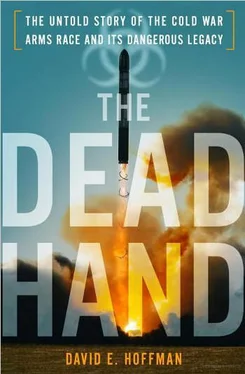In Moscow, Anatoly Chernyaev, deputy director of the International Department of the Central Committee, attended a briefing June 4 given by Marshal Sergei Akhromeyev, who was then deputy chief of the Soviet military’s General Staff. “It was amazing,” Chernyaev said, with “missiles homing in on their targets from hundreds and thousands of kilometers away; aircraft carriers, submarines that could do anything; winged missiles that, like in a cartoon, could be guided through a canyon and hit a target 10 meters in diameter from 2,500 kilometers away. An incredible breakthrough in modern technology. And, of course, unthinkably expensive.” 10
On June 28, Herbert E. Meyer, vice chairman of the National Intelligence Council, a think tank inside the CIA, sent a memo to CIA director William Casey titled “What Should We Do About the Russians?” Meyer noted the war scare of the previous year, and the paralysis in Moscow. He also saw the Soviet system under deep internal strain. “Decades of overemphasis on military production have wrecked the country’s civilian industrial and technological base,” he said.
More precisely, the Soviets have failed miserably to generate the kinds of innovations on which modern economies are increasingly dependent: robotics, micro-electronics, computerized communications and information-processing systems. Even if the Soviets could develop such systems, they could not deploy them without losing the political control on which the Communist Party depends for its very survival. For after 40 years of fear among Western intellectuals that technology would lead inexorably to Big Brother societies throughout the world, it now turns out that technology, in the form of personal computers and the like, has put communications and information processing beyond the control of any central authority. Unwilling and unable to develop and deploy innovations like these—as we in the West are doing with such robust enthusiasm—the Soviet Union can now produce little but weapons. 11
Reagan tried a back-channel gambit to reach Chernenko in April. Brent Scowcroft, who had been President Ford’s national security adviser, carried a letter from Reagan to Chernenko on a private trip to Moscow. 12He never got to see Chernenko, however. The letter went undelivered. “He believes the Soviet cold shoulder is due in part at least to their not wanting to help me get re-elected,” Reagan noted after talking to Scowcroft on his return. 13Scowcroft told reporters, “If you compare the political or psychological atmosphere between the two powers, it’s as bad as it’s been in my memory.” 14
When the Soviets announced May 8 they would boycott the upcoming Olympic Games in Los Angeles, Reagan concluded that Chernenko wasn’t completely in control, and the lion of the old guard, Gromyko, was running foreign policy. 15In June, the Soviets proposed opening talks on space weapons, but when Reagan asked to include ballistic missiles, Chernenko refused. “They are utterly stonewalling us,” Reagan wrote in his diary. Reagan cared about his reelection campaign, but his horizon was longer than just the vote. If “America was back,” then in his own mind, it was time to engage the Soviet Union. Reagan still did not have a Soviet partner, his first term was almost over and the paralysis in the Soviet elite was even worse than Reagan could have imagined at the time. 16
On August 11, 1984, at Rancho del Cielo in California, Reagan prepared for his Saturday radio address. He often made wisecracks in the warm-up, considered off the record by reporters and technicians present. Asked for a microphone check on this day, the president said, “My fellow Americans, I am pleased to tell you today that I’ve signed legislation that will outlaw Russia forever. We begin bombing in five minutes.” The remark soon leaked, and made headlines around the world, once again reinforcing the caricature of Reagan as a reckless gunslinger. TASS denounced the remark as “unprecedentedly hostile toward the USSR and dangerous to the cause of peace.” The president was chagrined. “Doing a voice level with no thought that anyone other than the few people in the room would hear I ad-libbed jokingly something about the Soviets,” he admitted in his diary. “The networks had a line open & recorded it and of course made it public—hence an international incident.”
On August 13, two days after the radio gaffe, at a lunch in Los Angeles, Shultz suggested, very tentatively, that Reagan invite Gromyko to the White House after the opening of the United Nations General Assembly in September. The president quickly agreed. “It’s the right thing to do,” Reagan said. “Try to work it out.” 17The meeting was arranged; it would be Reagan’s first with any member of the Soviet Politburo since becoming president. Reagan wrote in his diary, “I have a feeling we’ll get nowhere with arms reductions while they are suspicious of our motives as we are of theirs. I believe we need a meeting to see if we can’t make them understand we have no designs on them but think they have designs on us. If we could once clear the air maybe reducing arms wouldn’t look so impossible to them.”
Reagan spent most of Saturday, September 22, working on the speech he was to give the following Monday at the United Nations. It was “ticklish,” he acknowledged. “I don’t want to sound as if I’m going soft on Russia but I don’t want to kill off the Gromyko meeting before it takes place.” In his speech, Reagan offered not a word of criticism of the Soviet Union; the “evil empire” was gone. As he spoke from the podium, Reagan was watching the faces of Gromyko and the Soviet representatives, sitting in the front row, right below the microphone. “I tried to catch their eyes several times on particular points affecting them,” he recalled. “They were looking through me & their expressions never changed.”
Reagan finally got his chance to talk to Gromyko eye-to-eye in the Oval Office on September 28. They lectured each other. At one point, Gromyko recalled, Reagan reached into a side drawer and pulled out some charts on nuclear weapons. As the meeting broke for lunch, Reagan asked Gromyko to remain behind in the Oval Office. They spoke alone, in English, without interpreters. Gromyko had said the world was sitting atop a huge mountain of nuclear weapons that should be reduced. “My dream,” Reagan said, “is for a world where there are no nuclear weapons.” 18
Reagan escorted his guest down the long colonnade from the West Wing to the main White House mansion for a reception. Gromyko was amazed at the number of “English long-case clocks” in the White House and wondered if Reagan was a collector. A small chamber orchestra played classical music. Reagan introduced Nancy. At the end of the reception, Gromyko took Nancy aside and said, “Does your husband believe in peace?”
“Of course,” she replied.
“Then whisper ‘peace’ in your husband’s ear every night,” he said.
“I will, and I will also whisper it in your ear,” she said. And with that she leaned over with a smile and whispered softly, “Peace.” 19
At the end of the visit, the Soviet Embassy called Don Oberdorfer, diplomatic correspondent of the Washington Post , and asked for a photograph of Reagan talking to Gromyko that appeared in the morning paper. It showed Reagan’s hands on both of Gromyko’s arms. The photo was rushed over to Gromyko before his departure. Gromyko had first come to Washington forty-five years earlier. Although no one knew it then, this was his last trip to the White House. Reagan had finally met a member of the Soviet Politburo, but had yet to find one with whom he could do business. 20
Although Reagan wanted to talk to the Soviet leadership, he also approved policies to directly challenge the Soviet Union. At the behest of CIA director Casey, he vastly expanded proxy wars against Soviet influence in the Third World. In 1984, covert U.S. support for the mujahedeen fighting the Soviet army in Afghanistan reached a major turning point. The secret aid pipeline from the United States and Saudi Arabia, through Pakistan, suddenly bulged; by one account the total had tripled to hundreds of millions of dollars, in a matter of weeks. 21At the same time, Reagan wanted to channel money to guerrilla fighters, known as contrarevolucionarios , or contras, who were opposing the Sandinista government of Nicaragua. Reagan called the contras the “moral equivalent of our Founding Fathers” and he cast Nicaragua’s Sandinista junta, led by Daniel Ortega, as the front line in the war on communism. But Congress had cut off the aid to the contras, and money was running out in 1984. Reagan instructed McFarlane, his national security adviser, to keep the contras alive, “body and soul.” That summer, McFarlane reassured Reagan that Saudi Arabia had pledged $1 million a month into a secret bank account for the contras. The driving force in Afghanistan and Central America was Casey. “By the end of 1984, Casey’s covert war in the Third World against the Soviet Union and its surrogates was in full swing,” recalled Gates, who was then his deputy.
Читать дальше












